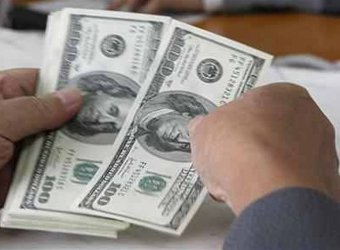The dollar sagged on Tuesday, knocked away from an eight-month highs versus the yen down as Treasury yields slipped on uncertainty over whether the Republicans can pass their tax bill in a timely manner.
The Australian dollar held steady, showing little response to the ReserveBank of Australia’s (RBA) well-anticipated decision to stand pat on monetary policy.
The dollar index against a basket of six major currencies was a shade lower at 94.729, slipping slightly from a 10-day peak of 95.077 reached on Monday.
Against the yen, the dollar nudged up 0.15 percent to 113.870 yen, but still some distance from 114.735 struck the previous day, its highest since mid-March.
The euro was steady at $1.1613 following its descent to a 10-day trough of $1.1580 overnight.
The greenback had been solid after strong U.S. services and factory dataissued before the weekend backed expectations for the Federal Reserve to raise interest rates next month and tighten further in 2018.
But the currency sagged as such expectations failed to lift Treasury yields. The benchmark 10-year yield has slipped steadily towards 2.30 percent after peaking at a seven-month high of 2.47 percent in late October.
“The dollar is lacking support from Treasury yields which have been declining on uncertainty over the U.S. tax bill and expectations that any rise in inflation would be slow,” said Junichi Ishikawa, senior forex strategist at IG Securities in Tokyo.
“For the dollar to sustain its gains it will need the speedy passage of the tax bill before Thanksgiving Day (November 23) to put a floor under Treasury yields.”
Doubts over whether U.S. Republicans could pass their tax plan have helped bring down long-term Treasury yields. The uncertainty dims hopes for faster economic growth, and there are worries about the scale of borrowing needed to finance the tax plan.
“Factors that could provide positive surprises for the dollar have run out,and we could see the currency slip into range for the time being,” said Masashi Murata, senior currency strategist at Brown Brothers Harriman in Tokyo.
“North Korea is always a background concern and now Saudi woes could push dollar/yen lower. But the long-term picture has not changed of a steady U.S. economic recovery supporting the pair, which is likely to find support around 112.00 yen.”
Australia’s central bank on Tuesday left its cash rate at a record low 1.5 percent, and signs indicated it would stay sidelined for months in the face of stubbornly low inflation and caution among debt-laden consumers.
The RBA eased twice last year but has since held steady as it balances the risk of fueling further borrowing in the country’s red-hot property market against tepid inflation.
The Australian dollar was little changed at $0.7692 after gaining about 0.5 percent the previous day against the broadly weaker dollar.
Other commodity currencies also performed well with oil prices climbing to 2-1/2-year highs this week amid political purges in Saudi Arabia.
The Canadian dollar stood at C$1.2713 per dollar following an overnight rally to a two-week high of C$1.2701.
The Norwegian crown added to gains from the previous day, when it rose 0.5 percent, to trade at 8.13 per dollar.
The New Zealand dollar was nearly flat at $0.6938 after gaining nearly 0.6 percent overnight to pull further away from a five-month low of $0.6818 reached at the end of October on political uncertainty. Source: Reuters
Source: Reuters


